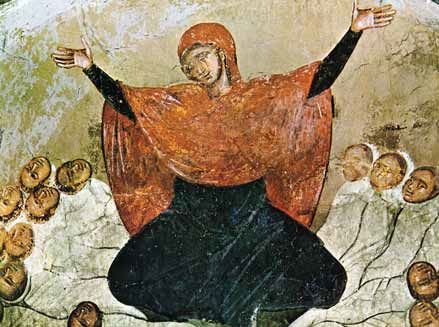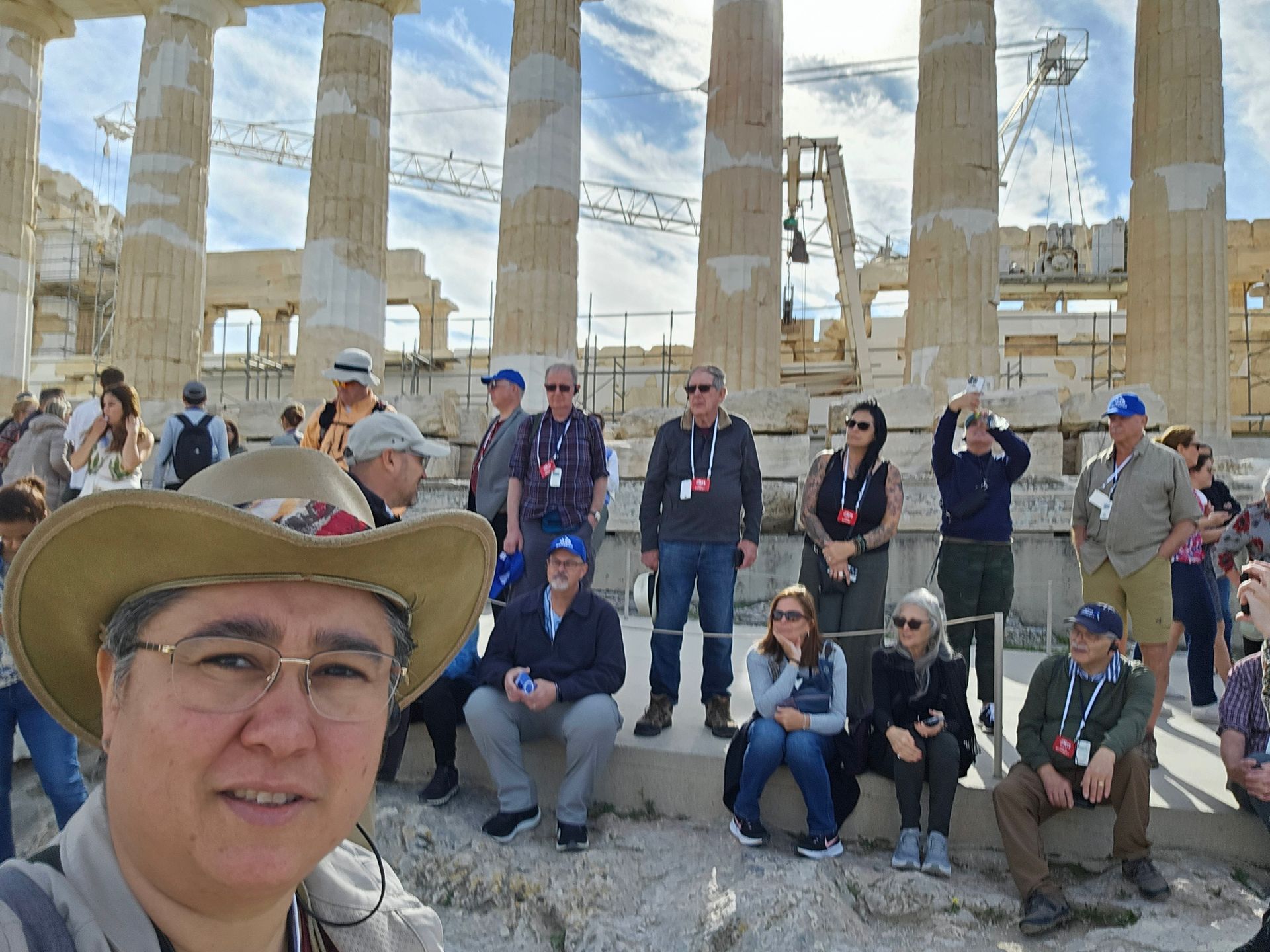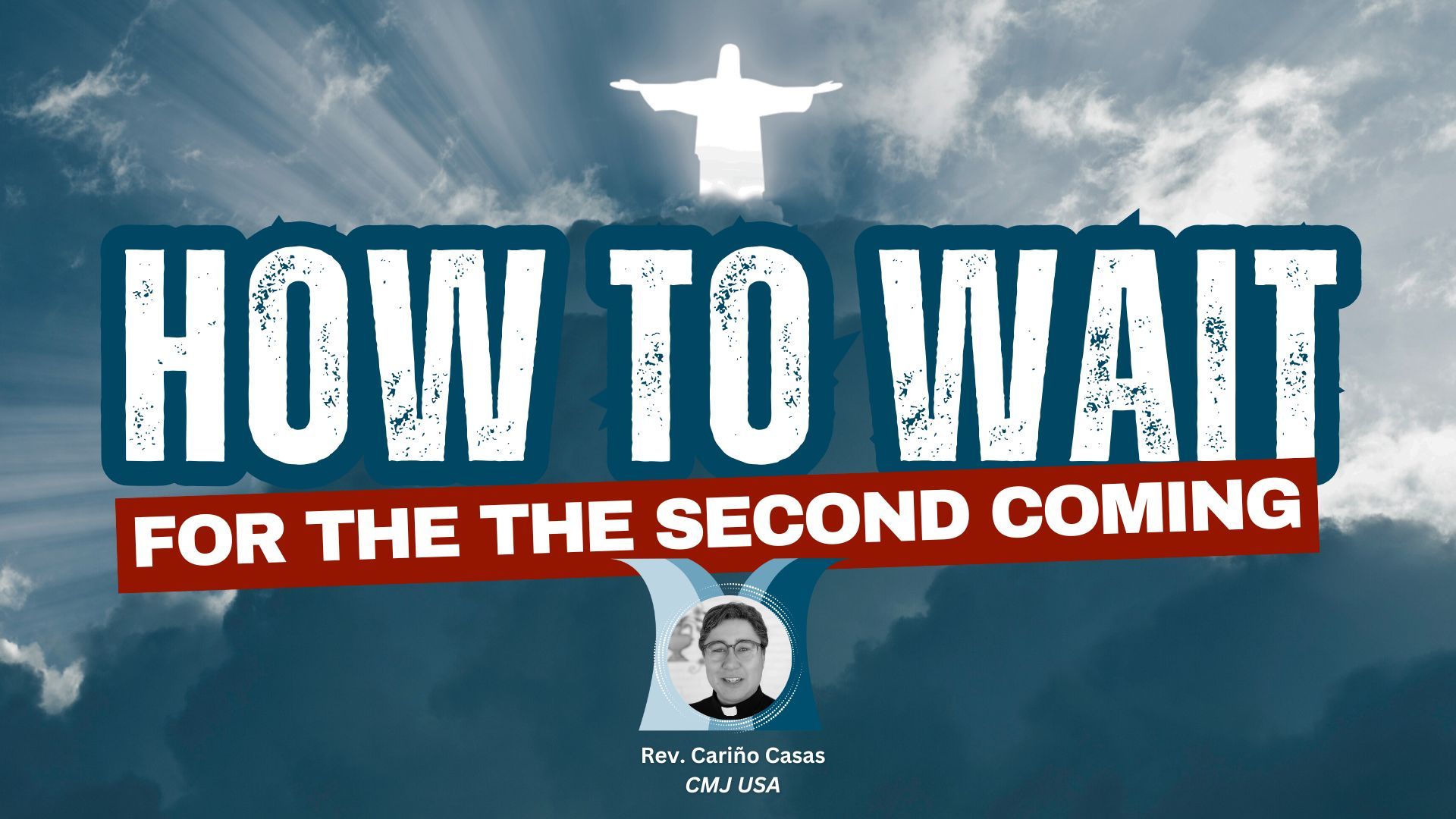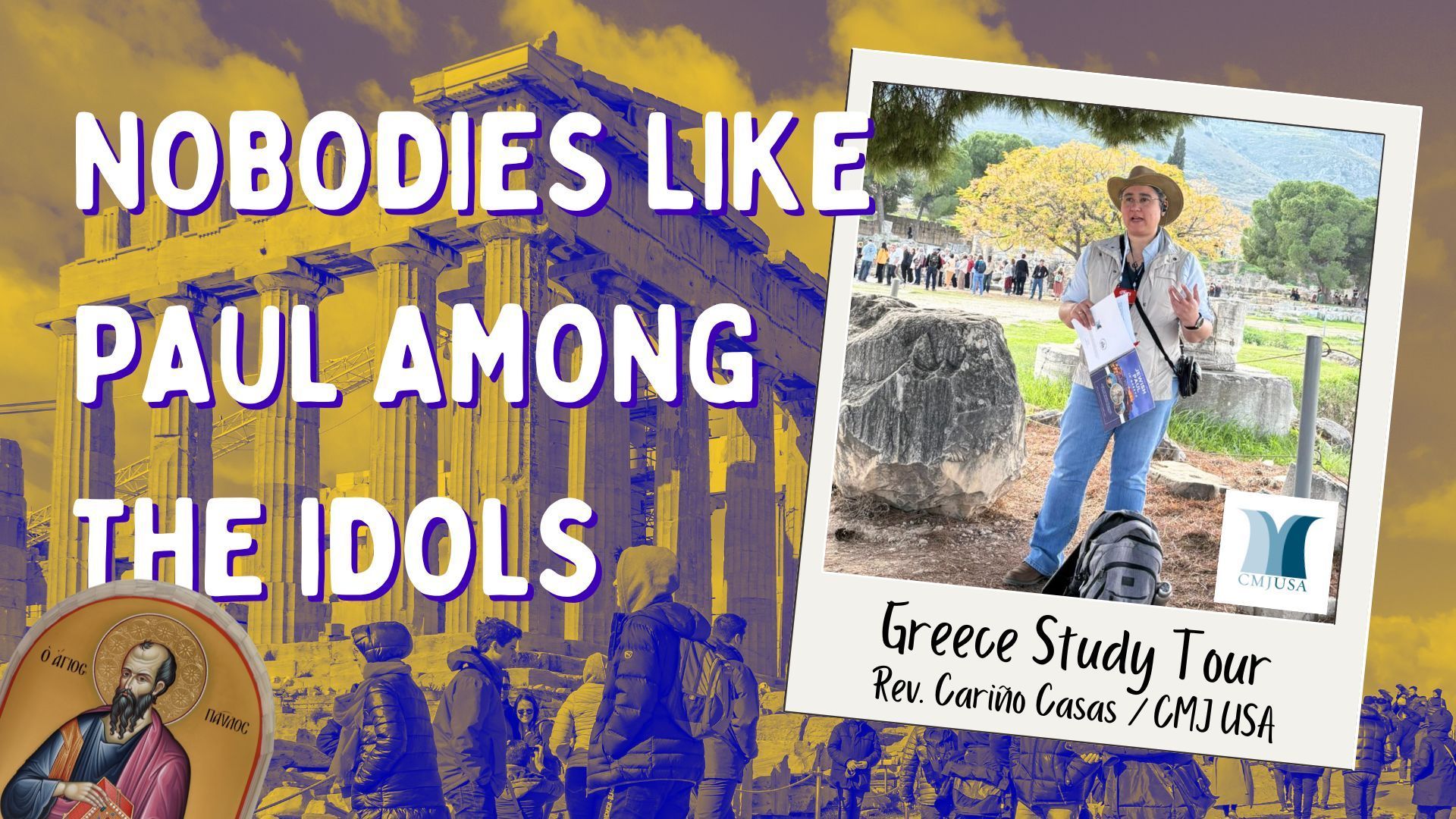Yeshua in our joy and sorrow (Jeremiah 31)
Feast of the Holy Innocents - the Slaughter at Bethlehem
Jeremiah 31:15-17
Psalm 124
Revelation 21:1-7
Matthew 2:13-18
Editor's note: This sermon was giving at Grace Anglican Church in Edgeworth, PA, on December 28, 2024.
Merry Christmas! Or is it?
Here we are in the “most wonderful time of the year” but we’re reading about the death of children. Not just death, but violent, gory murder.
Why are we contemplating death when we’ve just celebrated the incarnation of Resurrection Life itself?
Life is a mixture of joy and sorrow. While the Western Christian world celebrated Christmas, Russia attacked Ukraine, a passenger plane from Azerbaijan crashed, Israel fended off missiles from Yemen, displaced Gaza families tried to stay warm.
My aunt Gloria died on Christmas Eve this year. My sister Cris died the second week of Christmas 13 years ago.
For many families, the holidays are a mixture of joy and sorrow.
Still, Jesus sits at the right hand of the Ancient of Days. He came down and became flesh to live among us to live our sorrow and open the door to everlasting joy.
Joy and sorrow.
Our readings today also point to promise and fulfillment.
When Adam and Eve rebelled in the garden, God promised a redeemer. He promised a champion who would crush the lying Serpent. We eventually learn that the Snake Crusher will be from the family of Abraham. We hear that he will be like Moses, the Lawgiver (Deut 18:15). Then we learn he’ll be from the family of King David (2 Sam 7). He will conquer the Liar. He’ll die to ransom the nations (Isa 52:13ff).
Hundreds of years pass. Where is this promised champion?
Three men from Persia appear in Jerusalem and say they know. They know that the King of the Jews has been born.
The ruling king – Herod – is so insecure in his authority that he has his own sons killed. Now some outsiders from far, far away have come to tell him a new king has been born?!
Herod cannot stand it! He has murder in his heart. But God knows.
God makes sure baby Jesus as well as the Wise Men get away.
Mary and Joseph escape with Jesus and find refuge among the Egyptians – like Abraham, Jacob, and Moses for them.
But the people of Bethlehem get no warning. Herod sends his henchmen to murder all the boys under two.
Matthew uses a quote from Jeremiah to convey the sense of pain and sorrow felt by the people of Bethlehem.
A voice was heard in Ramah,
weeping and loud lamentation,
Rachel weeping for her children;
she refused to be comforted, because they are no more. (Mat 2:18)
Why this passage? Why does Matthew say it has been fulfilled? Is it just because it is a mother in the vicinity of Bethlehem weeping for lost children in the Hebrew Scriptures?
When the Gospel writers quote from the Hebrew Scriptures, they are referencing more than the words they quote. In Jewish teaching style, they are pointing to the greater context of the quoted verses.
This quote of Rachel weeping for her children is from Jeremiah 31, a chapter that Jesus will later reference at his last Passover Seder.
So let’s unpack what is promised in Jeremiah 31 and see what Jesus is fulfilling.
When the Gospel writers quote from the Hebrew Scriptures, they are referencing more than the words they quote. In Jewish teaching style, they are pointing to the greater context of the quoted verse.
Jeremiah was a prophet 600 years before Jesus was born. In Jeremiah’s time, the Assyrian Empire controlled the Middle East. They’d already conquered and scattered the people of northern Israel. The southern kingdom of Judah was intact but subservient to the Assyrians.
Judah had the temple, but they were worshiping false gods. To make things worse, they were oppressing the vulnerable: the poor, the widows, the orphans, the immigrants. Injustice and idolatry sadden and anger God.
The first half of the book of Jeremiah warns Judah to repent before the consequences of their crimes fall upon them. If they don’t repent, there will be a war that will result in Judah’s exile. The temple will be destroyed, and the people of Judah will be scattered just like their neighbors to the north 150 years before.
When God warns, he always calls us to confess, to turn back. He also always gives assurances of restoration and redemption. In Jeremiah, the middle chapters, Jeremiah 30-33, are called the Book of Comfort. These three chapters are filled God’s promise of his restoring love, a love that gathers the lost, mends their wounds, heals their sinful hearts.
Jeremiah 31 is pretty great. It promises dancing and merrymaking. It promises a rebuilt country, a multitude of children, and good priests satisfied with God.
Then we get these sad few verses of Rachel crying for her children.
A voice is heard in Ramah,
lamentation and bitter weeping.
Rachel is weeping for her children;
she refuses to be comforted for her children,
because they are no more. (Jer 31:15)
Jeremiah is speaking these words to a sinful people who have not yet experienced the exile caused by their sin. Later, these words will be read by the exiles in Babylon, far from home living among foreigners. And perhaps the happy words of comfort will be jarring in light of exile.
I remember getting in trouble as a kid. I’d get scolded. Maybe I even got spanked. Then dad would hug me and tell me he loved me. It was so dissonant. I was still sitting in the sorrow and pain of my sin. I’d cry right through the hug and the words of love. I felt like I wasn’t ready to hear the words of love.
Judah and Israel are not ready to hear God’s words of love. But God persists in his words of comfort:
Thus says the Lord:
“Keep your voice from weeping,
and your eyes from tears,
for there is a reward for your work,
declares the Lord,
and they shall come back from the land of the enemy.
There is hope for your future,
declares the Lord,
and your children shall come back to their own country. (Jer 31:16-17)
What work? That’s unclear. There are lots of opinions on what the LORD means by work. Is it penitence? Is it the work of repentance? Maybe. We cannot earn forgiveness. It is God who changes our stony, cold hearts into beating, feeling hearts of flesh. We do have to lean into God’s work of mercy and do our part of accepting God’s redemption.
Maybe Rachel’s work is mourning. Jesus tells us, ‘Blessed are those who mourn for they shall be comforted.’ Mourning is work, I can tell you after spending a year mourning the death of my best friend.

Why is Rachel the personification of mourning here? Rachel is called “our mother” in Judaism. There’s a street in Jerusalem named after her: Rachel Immanu, Rachel our mother.1
Rachel was the second wife but true love of Jacob the Patriarch. Rachel was childless for years while her sister Leah had many children. God does hear Rachel’s prayers and she eventually gives birth to Joseph and Benjamin but dies in childbirth.
Rachel becomes a symbol of the sacrificial mother and her tomb a place of pilgrimage for the childless.
As I mentioned earlier, Jeremiah 31 is full of promises of restoration and redemption. One of the promises that God makes is that the divided kingdom of Israel – northern Israel and southern Judah – would reconcile and be reunited as in King David’s day.
Rachel’s two sons represent the two divided kingdoms: Joseph’s sons settled in idolatrous northern kingdom and Benjamin’s sons joined Judah in the south. So Rachel mourns for the exile of both halves of divided Israel.
Rachel refuses to be comforted because these children are no more.
But God insists on comforting. Not all is lost, as Rachel must feel. The exiles will return. God will restore the people and the land. The two kingdoms will be reunited. ‘Your children shall come back to their own country.’
Let’s lay the joy and sorrow of Jeremiah on the Christmas story.
After thousands of years of waiting, the Son of Abraham, Son of David is born. The Seed of the Woman promised in Genesis 3, the champion who will crush the Liar is finally born! Billions of angels literally light up the night sky to praise God the night Jesus is born. There are shepherds running to and fro to tell the good news. Some magi traveled 1,000 miles to bring gifts and worship the Son of God.
Then tragedy! The King of Israel must flee. He must leave his own country and be exiled. Not only that, an unstable tyrant has shed innocent blood.
Yes, the mothers of Bethlehem are mourning their dead. And perhaps billions of angels are wondering what happened that the Son of God, the King of Israel is now in Egypt.
And God tells the angels,
Keep your voice from weeping,
and your eyes from tears,
I will call my son out of Egypt.
There is hope for the future,
The child shall come back to his own country.
Jesus does make it back to Judea and to Galilee. He grows up in Nazareth. He learns his adopted father’s trade. He is hidden from the suspicious eyes in Jerusalem for 30 years until it’s time to announce his mission.
What is his mission? Fulfill the rest of Jeremiah 31.
A little further down from God telling Rachel not to weep, God gives another promise:
Behold, the days are coming, declares the Lord, when I will make a new covenant with the house of Israel and the house of Judah, not like the covenant that I made with their fathers on the day when I took them by the hand to bring them out of the land of Egypt, my covenant that they broke, though I was their husband, declares the Lord. For this is the covenant that I will make with the house of Israel after those days, declares the Lord: I will put my law within them, and I will write it on their hearts. And I will be their God, and they shall be my people. And no longer shall each one teach his neighbor and each his brother, saying, ‘Know the Lord,’ for they shall all know me, from the least of them to the greatest, declares the Lord. For I will forgive their iniquity, and I will remember their sin no more. (Jer 31:31-34)
As God is about to send Judah into exile, he promises that he will regather both scattered Israel and Judah. He’ll make a new covenant with all 12 tribes. At Sinai, God wrote his law on stone tablets. In the New Covenant, he’ll write his Torah on people’s hearts and forgive all their sins.
Fast forward from Jeremiah to Jesus, now grown and three years into his ministry. He’s been declaring the coming of the Kingdom of God. He’s identified himself as the long-awaited Son of David, the Messiah. He is the Seed of the Woman come to crush the Serpent.
He gathers his followers for one more Passover meal, remembering how God freed Israel from Egyptian slavery. The Passover meal is a remembrance of God’s faithfulness.
In the middle of the meal, Jesus takes a cup of wine and says, “This cup that is poured out for you is the new covenant in my blood” (Luke 22:20). They have all just recalled God’s faithfulness as told in Exodus. But now Jesus is calling out God’s faithfulness to the promises made in Jeremiah.
Jesus proclaims that the New Covenant promised to Israel and Judah in Jeremiah 31 has been instituted. Sins are forgiven. God sends the Holy Spirit to teach our hearts his ways. We need only accept his free gift of mercy and pledge our loyalty to his Son, Jesus, who now reigns in heaven at the right hand of the Father and who will rule and reign in Jerusalem in the age to come.
And don’t think this is just for Israel. Jeremiah also sees us – the nations – caught up in God’s redemption. When Jerusalem shall be called the throne of God, “all nations shall gather to it, to the presence of the Lord in Jerusalem, and they shall no more stubbornly follow their own evil heart” (Jer 3:17). When Israel returns to the God of their Fathers and his Messiah, “then nations shall bless themselves in him, and in him shall they glory” (Jer 4:2).
So rejoice! Jesus has stepped into our sorrow to give us joy. Jesus has suffered exile so that we can be gathered into God’s presence. He has mourned so that he can comfort us. He has crushed the Serpent so that we can return to the Garden of Eden. He has died so we can live.
Come to the table and drink the cup of the New Covenant. Jesus knows your sorrow and he knows your joy.
I will close with the words of an old Rich Mullins song that captures the spirit of today’s feast and of Jeremiah’s prophetic words.
Joseph took his wife and her child
And they went to Africa
To escape the rage of a deadly King
There along the banks of the Nile
Jesus listened to the song
That the captive children used to sing
They were singin'
My deliverer is comin', my deliverer is standin' by
My deliverer is comin', my deliverer is standin' by
Through a dry and thirsty land
Water from the Kenyon heights
Pours itself out of lake Sangra's broken heart
There in the Sahara winds
Jesus heard the whole world cry
For the healin' that would flow from His own scars
The world was singin'
My deliverer is comin', my deliverer is standin' by
My deliverer is comin', my deliverer is standin' by
He will never break His promise
He has written it upon the sky2
Footnotes
- There is a midrash that Rachel, learning her father’s plan to go back on his word and give Leah as wife to Jacob, gave her sister a password Jacob and Rachel had so he would accept Leah on the wedding night. In that scenario, then Rachel facilitates the marriage to Leah and so can be said to be mother to all 12 tribes. Lamentations Rabbah, Petihta, 24.2, 3. See also Naftali Silberberg, “Rachel's Amazing Secret,” Chabad.org. https://www.chabad.org/parshah/article_cdo/aid/459520/jewish/Rachels-Amazing-Secret.htm
- Richard W Mullins & Mitchell Lade Mcvicker, “My Deliverer,” The Jesus Record (Sony/Word, 1998)
Blessed by this post? Ready to sow into the work of CMJ? No gift is too small. we are blessed by your partnership.



